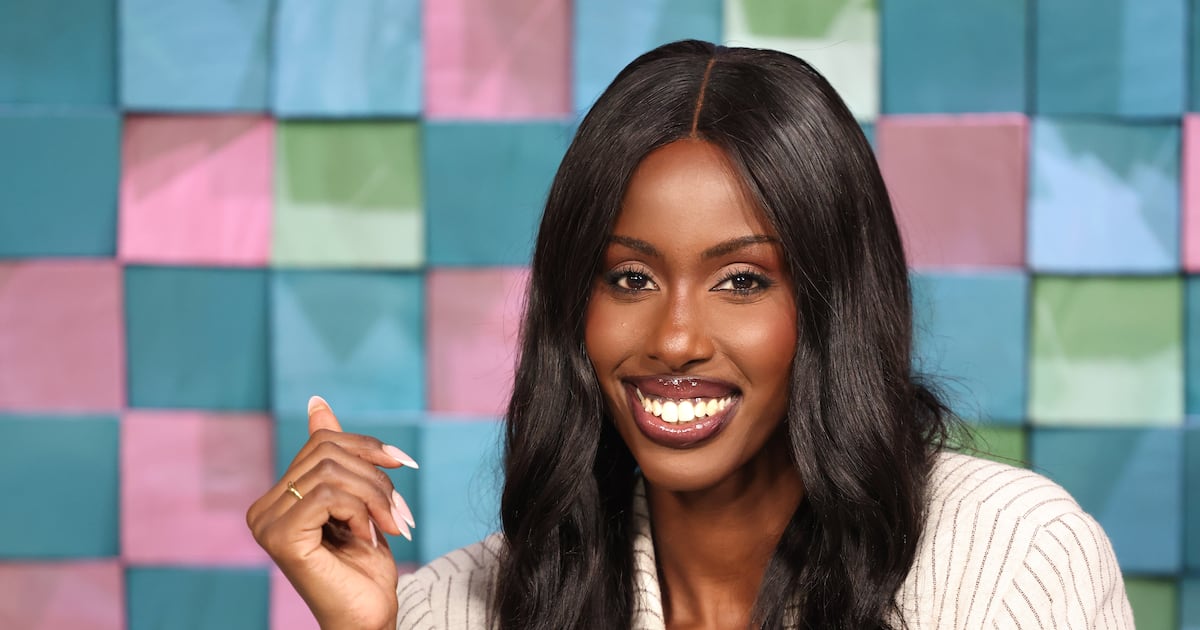When Dublin TV presenter, influencer and model Katja Mia was doing the Leaving Cert more than a decade ago, she plastered the study area in the Blanchardstown family home with motivational quotes from the likes of Winston Churchill and Nelson Mandela.
“I was not blessed academically, I was one of those people who had to work really hard to get just above average,” she says. “I had all these quotes posted up everywhere, I’d write down the number of points I wanted to get so I could see them.”
She was manifesting before manifesting became a thing? “I suppose I was,” she laughs. “But I also studied for hours and hours. Nothing came easily.”
While it’s been an often-derided TikTok trend for a few years now, manifesting – the idea that our thoughts and actions can positively influence what we accomplish – has actually been a thing for a while.
There’s a Sanskrit text called Rigveda from 3,500 years ago containing hymns that suggest that by focusing on our hopes and dreams we can influence personal destiny. At any rate, the presenter is something of a poster girl for the trend.
From a family of Burundian immigrants a combination of ambition, determination, hard work, luck and – scoff if you like – manifesting eventually landed her her dream job presenting the Six O’Clock Show on Virgin Media.
We’re talking in the boardroom of the television station before she goes to studio to record the hour-long live show. She’s wearing black athleisure wear and there’s a large – “lab grown” she qualifies – diamond engagement ring sparkling on her finger.
In a couple of weeks, she’ll go to Burundi, in east Africa, for the first time in 15 years to take part in a traditional “dot” engagement ceremony in front of 300 family and friends. It will be a chance for her fiancé and boyfriend of eight years, Daragh Curran, an influencer called The Guinness Guru who specialises in tasting pints of the black stuff all over the world, to meet her extended family.
Having grown up in Dublin she’s looking forward to immersing herself in the culture of her parent’s homeland, royal Burundian drummers and traditional costumes included. “I’m embracing all of it,” she smiles. Her mother Carinie is all over the arrangements. The wedding next year will be an Irish one. “We’ll do our own thing for that,” she says.
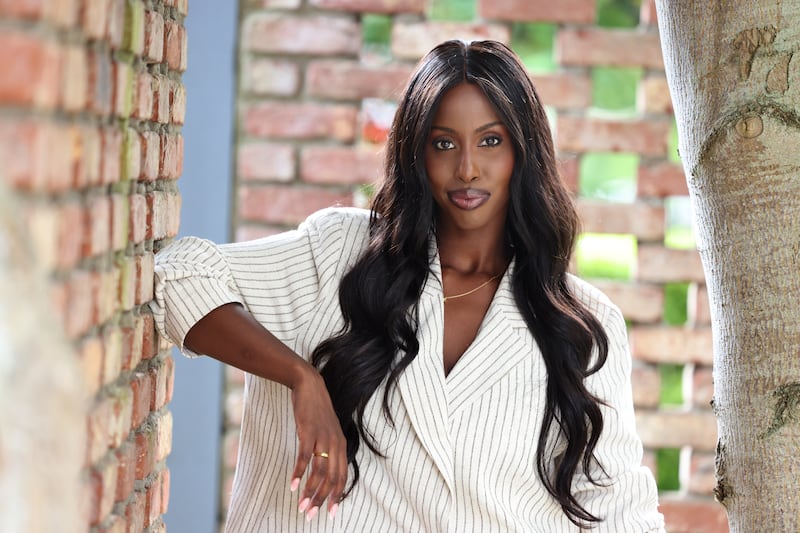 ‘If I can have longevity in this industry, then I’ll be very happy,’ says Katja Mia. Photograph: Dara Mac Dónaill
‘If I can have longevity in this industry, then I’ll be very happy,’ says Katja Mia. Photograph: Dara Mac Dónaill
The goal, as she grew up, was financial security, which explains the motivational quotes and commitment to her studies. She was born in Germany, in 1996, after her parents sought refuge there from the civil war in Burundi, a protracted conflict between the Hutu and Tutsi ethnic groups, which killed an estimated 300,000 people from 1993 to 2005. Her uncle had been murdered in a grenade and knife attack in the former Belgian colony and “there was a threat to my dad’s family in particular so he had to flee the country”.
The family spent a couple of years in a village near Frankfurt but when they went to get their visa renewed it was denied. The family’s difficulties in Germany were compounded by the racism they were subjected to by neo-Nazis. Unable to return to Burundi, the family came to Ireland as undocumented immigrants.
She was only 17 months old when they moved to Dublin, first settling in Blackrock. The Department of Justice initially refused their application for asylum on the grounds that they had made their original application in Germany.
Threatened with deportation she says her father Joseph was given assistance in his campaign for his family to stay in Ireland by “some excellent people” including former Irish Times journalist Andy Pollak. “My dad saw him talking on a news programme one day and looked up his number in the phone book,” she says.
Later, I find an Irish Times news report from 1998 about the family’s experience in Germany and the racist abuse they suffered there.
“It was torture,” her mother Carinie told Irish Times reporter Paul Cullen back then. “We had already left one form of atrocious situation, [in Burundi] and now we were in another. We were just looking for somewhere calm, where our children can grow up and be integrated in society.” Eventually, they were given leave to remain in Ireland and got their Irish passports.
They instilled positive affirmations in us about being black from a really young age
— Katja Mia
Her parents’ experience as immigrants has had a significant influence on the presenter. “I was always aware of their struggle. They were educated but English is not their first language so they had to start from the bottom and I witnessed that.” Joseph and Carinie, who also speak French, encouraged their four children to speak English at home instead of Kirundi, the official language of Burundi, so that they would have a better chance of integrating.
Her mother worked in a supermarket and her father, now a taxi driver, had two jobs at one point. “I would see him come home from one shift and put on his uniform for a second job. I think when I saw that it really instilled a work ethic and made me put my head down. They came here for me to have a better life. They didn’t want me to struggle. When you see people struggle it makes you want to go after security and financial stability”.
The family moved from Blackrock to Usher’s Quay in the city centre and then to Lucan where she attended primary and secondary school even after the family eventually settled in Blanchardstown. “Growing up I always felt Irish, I sang Irish songs, did Irish dancing, on Brigid’s Day we celebrated Nano Nagle. When you are migrating to a new country, integrating is everything, especially for kids.”
Every Monday afternoon from the age of six she’d go to a stage school in Lucan where she thrived – dancing and singing in shows.
It wasn’t until the move to Blanchardstown that the family became victims of racist attacks. “We were the first black family on our council estate. There were a lot of teenagers coming to our house, throwing eggs at our windows, breaking my mum’s car door on a weekly basis. It was a kind of torment, to be honest.”
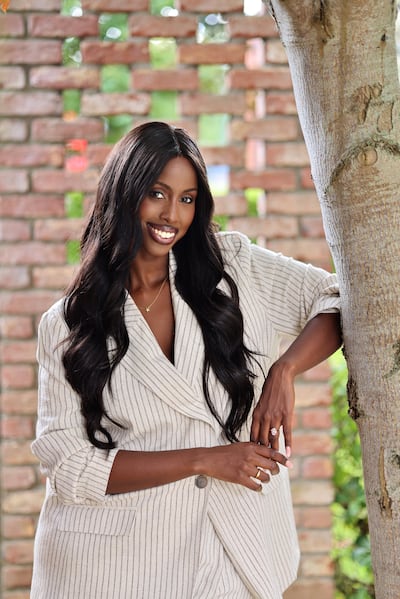 ‘A friend sent me a link to a competition for online presenters and I ended up winning it.’
‘A friend sent me a link to a competition for online presenters and I ended up winning it.’
Photograph: Dara Mac Dónaill
“I remember vividly one day being egged by a group of boys, and I was only 11 or 12, I had my uniform on and I was just drenched in eggs … you have to reassure yourself that people are ignorant, they’re doing it out of fear and you should not waste your energy trying to defend yourself because you’ve nothing to defend.
“And I think it stood to me, because even now, working in media, it’s inevitable that you’re going to get comments, people that don’t like you for whatever reason, whether it’s the dress you’re wearing your make-up or whatever.”
This resilience was modelled by her parents who changed the narrative when it came to their four children. “They instilled positive affirmations in us about being black from a really young age. They’d tell me: ‘You have amazing skin, you are a descendant of the Tutsi tribe, you are beautiful, be proud’.”
When it came to choosing her career path, despite her love of performing, her need for security led her to pursue finance. The motivational quotes paid off. She got enough points for a finance and economics degree from Maynooth University and went into banking as a depository analyst working in funds.
In the pandemic, she began a remote job in Bank of America but she wasn’t happy. “I was lost,” she says of her time in the corporate world. “I had no passion. I didn’t know what I was doing. I even started praying about it.”
By now manifesting was everywhere. “I read the books, I listened to podcasts and I started posting on Instagram almost as a tool to throw s**t at the wall and see what stuck”.
She began curating her feed “in a fun, aesthetic way” building an audience. When a friend needed a presenter for a music show in Swords, she nervously accepted. “It was a nine or 10-hour day but it felt like about 10 minutes because I was having the time of my life. I just thought, how can I make this a job?”
There are people on TikTok saying, ‘Ireland is for the Irish’. People get angry at me, telling me: ‘You’re not Irish’
— Katja Mia
She had grown up admiring presenters like Kathryn Thomas and Martin King “who I ended up working with”. She’d watch E! News all the time. “I was obsessed with television culture, but I had no idea how to get into it … then a friend sent me a link to a competition for online presenters and I ended up winning it.”
The competition, to be a brand ambassador for Love Island presenter Maya Jama’s skincare range Mij Masks, was open to people across the UK and Ireland. It was the break she was hoping for and led to Virgin Media getting in touch.
She began there as a contributor, moving to hosting on Weekend AM with Martin King. At one stage, when Ireland AM presenter Muireann O’Connell was on holiday, she got a call to replace her for three shows. “That was just wild to me. My whole family was jumping on the bed. It’s a three-hour live show. I’ll never forget that moment.”
Eventually, she was named as the new permanent host with Brian Dowling of the station’s Six O’Clock Show. That was in November 2023, less than two years after landing her first presenting job. “Ideally, in a dream world, I would have done a degree in media and journalism, naturally I still feel impostor syndrome, but I learn from people, I learn by making mistakes. It worked out the way it worked out and I have so much backing in Virgin Media, I’ve been really supported.”
[ We cannot police the streets if online material is not regulatedOpens in new window ]
In the meantime she had been spotted by a modelling scout on Instagram, which she calls “the modern day CV for creatives”, and was a “curvy” model for a few years.
Last year, when she was one of the celebrities competing in Dancing With the Stars, she received abusive messages about her size. “I got comments about whether my dance partner could lift me, people saying: ‘She’s a disgrace’.”
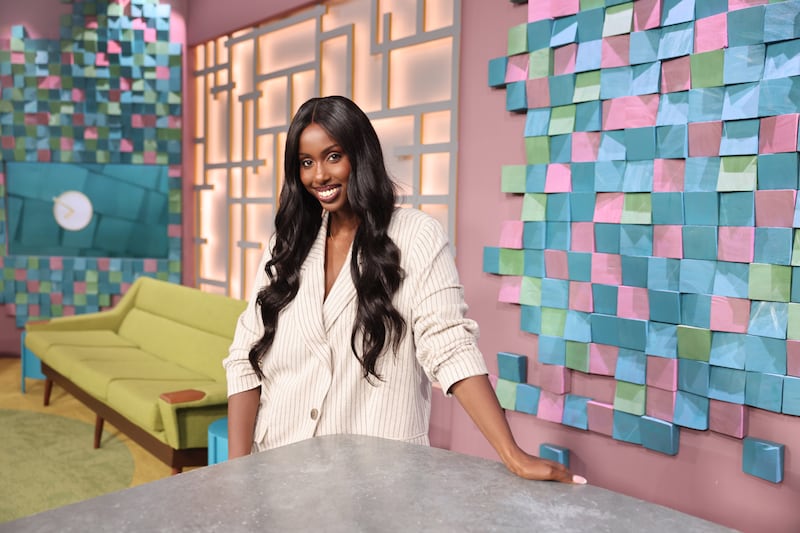 ‘I am someone who really wants to create a comfortable life for myself and stability for my family,’ says Katja Mia. Photograph: Dara Mac Dónaill
‘I am someone who really wants to create a comfortable life for myself and stability for my family,’ says Katja Mia. Photograph: Dara Mac Dónaill
Did the abuse affect Katja? “Absolutely, it did,” she says. “I would find myself on rehearsal days looking at playback, focusing on how big my thighs looked instead of my dance form. I have to say, once I shared the horrible comments there was so much support”.
She has spoken of dealing with endometriosis and says her weight has always fluctuated. Of the abuse she says: “I have the tools to deal with it, I just needed to reinforce those positive affirmations. And my family were amazing. They just thought it was cool that I was dancing on TV.”
Inevitably, given her backstory, we talk for a while about the rise of anti-immigration sentiment and the “Ireland is full” protests around the country. She is thoughtfulon the subject. “It’s conflicting,” she says. “I am a young person living in Ireland, I know it’s tough.”
“I have a friend coming home from Australia with her boyfriend and they are finding it so hard to find somewhere to live. I understand that people are in a difficult position and when things get hard people look for people to blame. And the easiest targets are the newbies, the immigrants, the people who don’t sound like you or look like you.”
[ Manifesting is the perfect religion for our times. But does it work?Opens in new window ]
She says she hates “it’s come to that” because she immediately thinks of her parents. “They still have accents, when they talk they don’t sound Irish even though they’ve been here for so long. They are easy targets. I am someone with black skin. I know that just walking around without someone hearing my Dublin accent, I will be judged.
“Something could happen to me. So I hate that black and brown people, any people of colour in Ireland, are in danger and have to worry about abusive and racist rhetoric and also physical violence.”
The “conflict” she feels on the issue is about the challenges many people in this country face. “I’ve lived in Ireland my whole life. I pay taxes in this country, but I know when the time comes around when I get married and I want to look for a house, it’s going to be incredibly difficult, even though I work hard and I know other people are working hard too.”
“People just want a better life for themselves. But at the same time, it’s not the fault of immigrants who are just trying to blend and integrate into a country,” she says.
“It’s the fault of a Government that needs to do better. The pressure should lie with the Government to create resources for people who are struggling with the socio-economic situation, who can’t get houses. They need to be the ones to create a solution.”
I feel like it’s very taboo to say, but I am someone who really wants to create a comfortable life for myself and stability for my family
— Katja Mia
I ask how she feels being asked about this subject. Does it get wearying? “Every time I talk about it, and I’ve talked about it a lot, it always comes with a certain amount of hate. So I’ve become more apprehensive. There are people on TikTok saying, ‘Ireland is for the Irish’. People get angry at me, telling me: ‘You’re not Irish’. They say: ‘You’re a diversity hire’. They say all these crazy things so I’ve drawn back on it a bit”.
But does she feel it’s important to speak out? “Yes, especially now seeing the attacks on Indian people, it’s heartbreaking. I grew up with Indian friends in my class and Pakistani friends. They’ve been here for years. And the new people should be welcomed too because at the end of the day we’re citizens of the world. The Irish history of migration in Australia, in Canada and in America is well known and there is never any issue with that. It’s clearly a skin colour issue and that’s what makes me upset.”
In 2020, attending a protest against the murder of George Floyd by police in America, she told an Irish Times reporter that watching the footage of Mr Floyd’s death made her think of her father and brother. “My dad has such a gentle soul and to think that someone would look at him and perceive him as violent from the colour of his skin is absolutely outrageous. We’re protesting here for George Floyd but also for every black person who has gone through discrimination.”
Now, she says: “My dad is a taxi driver, I get afraid for him when he is out at night because these people seem to have this new-found confidence to be blatantly racist and they think it’s okay to hurt people like that. So I get upset and I get scared, I worry about the people I care about. These are weird times.”
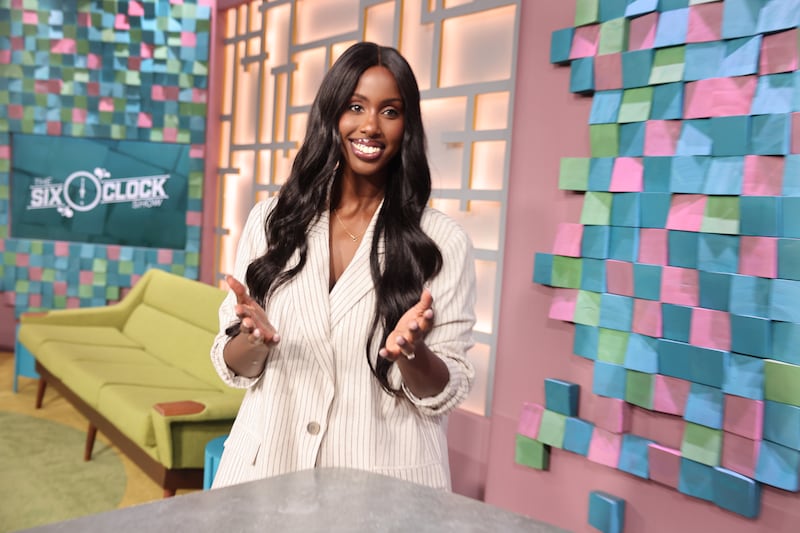 Katja Mia is something of a poster girl for the manifesting trend. Photograph: Dara Mac Dónaill
Katja Mia is something of a poster girl for the manifesting trend. Photograph: Dara Mac Dónaill
On a more positive note, she’s happy to see things moving, however slowly, in terms of increased representation and participation of people of colour in Irish society. “I feel like it is slowly changing in a natural, unforced way. What you are seeing is the second generation of immigrants growing up and choosing careers like presenting or being make-up artists, there are more of us in the creative industries.
“I think traditionally there was a lot of pressure to be, like, a doctor or a lawyer. But we also need to have visual representation in creative spaces too. And I think slowly we’re getting that.”
In many ways, she is still the industrious Leaving Cert student, pushing herself forward to the next thing. She’s still manifesting, still dreaming. “I’ve had to back myself and be like: this is what you asked for, what you dreamt of, so work hard, open your ears, learn”. She’ll turn 30 next year. There’s a wedding to plan. What are her latest goals?
“I feel like it’s very taboo to say, but I am someone who really wants to create a comfortable life for myself and stability for my family. It’s always at the back of my mind, it goes beyond myself. I have dreams of buying a home for my family one day, and of having the life that I always dreamed of in Ireland, especially growing up through struggle,” she says.
“It’s made me hyper-ambitious and focused on having security in life. I have a job that really drives me, a job I’m very lucky to say I love.I’ve met amazing people and the dream is just to continue doing something like this. If I can have longevity in this industry, then I’ll be very happy.”
Katja Mia presents The Six O’Clock Show with Brian Dowling every weekday on Virgin Media

